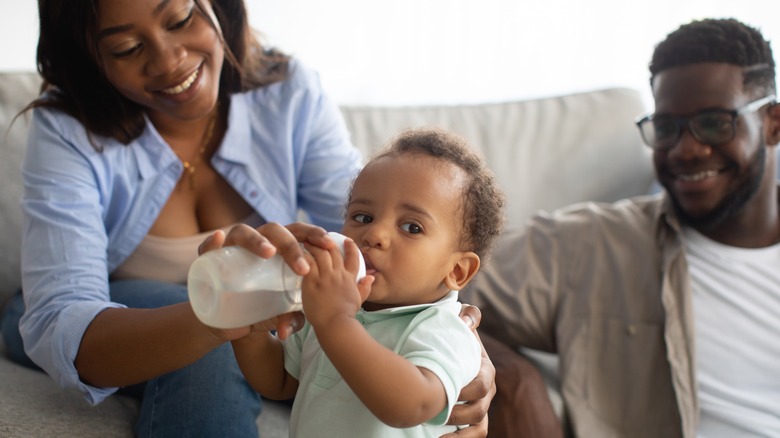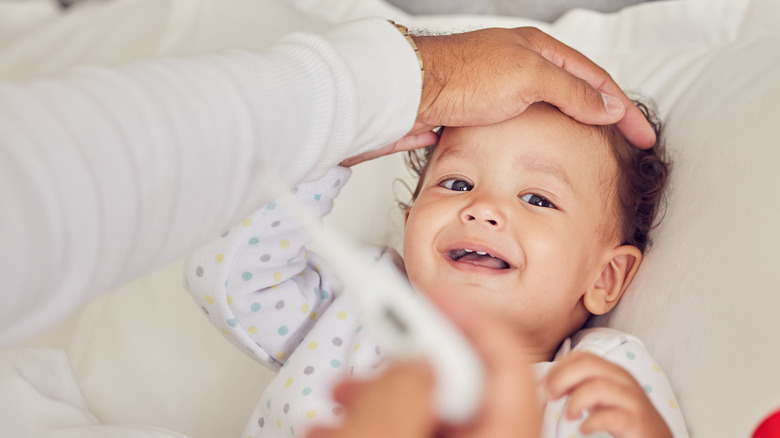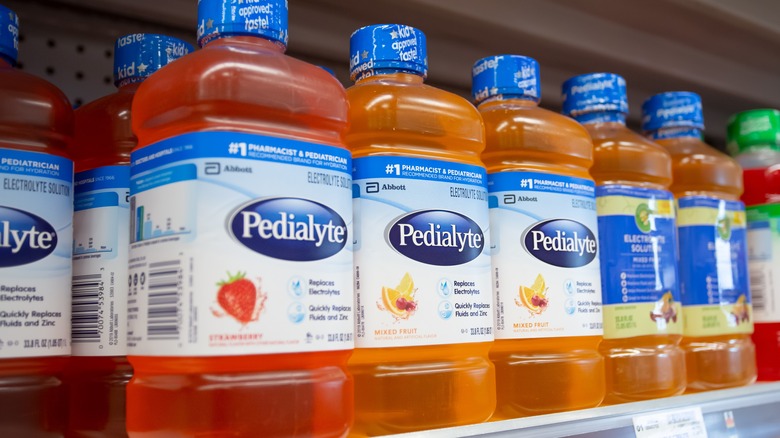When To Give Your Baby Pedialyte For Dehydration
According to StatPearls, as many as three-quarters of adults in the U.S. aren't drinking enough water on a regular basis. While that's a significant number of adults considered to be chronically dehydrated, infants and babies tend to be even more vulnerable to the condition. A number of factors play into this, including the fact that young children experience an increased loss of body fluid, have a higher metabolic rate, and are often unable to hydrate themselves or effectively communicate that they are thirsty (per StatPearls).
While the severity of dehydration can vary, symptoms of pediatric dehydration often include weight loss, increased heart rate, rapid breathing, sunken eyes, fewer tears, sunken soft spot, and decreased urination.
Dehydration may accompany a fever, vomiting, decreased oral intake, lethargy, and diarrhea (per Healthline). In fact, diarrhea is one of the leading causes of dehydration in babies.
Pedialyte — which is made up of water, minerals, and sugar — is a product designed to protect against dehydration or replenish fluids in young children. Even better, there's no prescription necessary. However, it's best to give your baby Pedialyte only under certain specific circumstances.
The best time to give Pedialyte
In some cases, Pedialyte may be acceptable to give young children on a more regular basis. For example, Pedialyte may be utilized in addition to formula or breastfeeding for young babies that haven't gone through the weaning process yet, according to experts at Healthline. However, be sure to consult with your pediatrician before doing so. For babies who have been weaned, Pedialyte may be optimal over other everyday liquids, including water.
For cases of dehydration that are less severe, Healthline advises that Pedialyte is best given to babies immediately after they have vomited or experienced diarrhea. This is also true in the event of fever, increased sweating, or minimal fluid intake while sick. In doing so, caregivers can help prevent mild or moderate cases of dehydration from quickly becoming more severe and potentially requiring hospitalization.
If you're unsure as to whether or not your baby may be dehydrated, consider diaper changes as a good frame of measure. While urine output may still be the same in cases of mild dehydration, babies with moderate dehydration will produce fewer than four wet diapers in a 24-hour period. Babies that produce no more than one to two wet diapers in 24 hours are considered severely dehydrated.
Precautions to consider when using Pedialyte
While you should always follow the product instructions when it comes to dosage amounts, as a general guideline, encourage your child to take small sips of Pedialyte every 15 minutes if they're showing signs of dehydration. However, different children may benefit from different dosages depending on their severity of dehydration, age, or weight, so be sure to check with your pediatrician first.
Additionally, Pedialyte is not intended for use in infants under 1 year of age, unless otherwise instructed by your doctor. It should also not be blended directly with baby formula, as this can potentially exacerbate illness (via Mom Loves Best). This is also true for older children, since mixing in additional liquids will dilute the balance of sugar and electrolytes in Pedialyte and potentially make the child sicker (per Healthline). Generally speaking, it's best to give Pedialyte to your child exactly as is, without any modifications.
In rare instances, a child can have an allergic reaction to Pedialyte. Therefore, seek medical care if your child presents with potential allergy symptoms, such as rash, hives, itchiness, or difficulty breathing.



